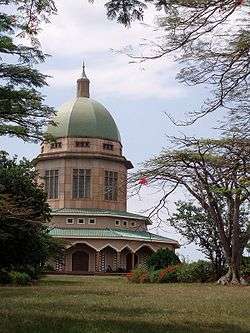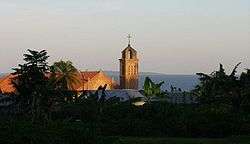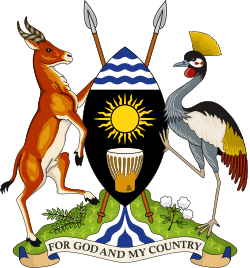Religion in Uganda
.jpg)
Uganda is religiously diverse nation with Christianity and Islam being the most widely professed religions. According to the 2014 census, over 84 percent of the population was Christian while about 14 percent of the population adhered to Islam.[1] In 2009, the northern and west Nile regions were dominated by Roman Catholics, and Iganga District in the east of Uganda had the highest percentage of Muslims.[2]
Good Friday, Easter Monday, Eid al-Fitr, Eid al-Adha, and Christmas are recognized national holidays.[2]
Government policy
Freedom of religion is guaranteed by the Uganda Constitution, but religions are expected to be registered with the government. Some religions considered to be cults are restricted. The Catholic Church, the Church of Uganda, the Orthodox Church, and the Uganda Muslim Supreme Council are registered under the Trustees Incorporation Act. Most other religious groups are registered yearly as non-governmental organizations.[2]
| Affiliation | 1991 census | 2002 census | 2014 census[1] |
|---|---|---|---|
| Christian | 85.4% | 85.2% | 84.5% |
| Roman Catholic | 44.5% | 41.9% | 39.3% |
| Church of Uganda (Anglican) | 39.2% | 35.9% | 32.0% |
| Pentecostal | -[note 1] | 4.6% | 11.1% |
| Seventh-day Adventist | 1.1% | 1.5% | 1.7% |
| Baptist | -[note 2] | -[note 2] | 0.3% |
| Orthodox Christian | <0.1% | 0.1% | 0.1% |
| Other Christian | 0.6% | 1.2%[note 3] | -[note 2] |
| Muslim | 10.5% | 12.1% | 13.7% |
| Traditional | - | 1.0% | 0.1% |
| Bahá'í Faith | -[note 1] | 0.1% | -[note 2] |
| None | -[note 1] | 0.9% | 0.2% |
| Other non-Christian | 4.0% | 0.7%[note 4] | -[note 2] |
| Others | -[note 2] | -[note 2] | 1.4% |
Notes
| |||
Christianity
According to the national census of October 2002, Christians of all denominations comprised 85.1 percent of Uganda's population.[3] The Roman Catholic Church had the largest number of adherents (41.9 percent of the total population). The largest Protestant church was the Anglican Church of Uganda, a part of the worldwide Anglican communion, at 35.9 percent. There were numerous Pentecostal churches (4.6 percent), while 1.0 percent were grouped under the category "Other Christians".[3]
Jehovah's Witnesses operate in Uganda under the International Bible Students Association name and are working in a total of ten languages, including Swahili and Luganda. Followers of William M. Branham and Branhamism claim numbers in the tens of thousands, thanks in large part to translation and distribution efforts by Voice of God Recordings.[4]
The Presbyterian Church in Uganda has 100-200 congregations. The Reformed Presbyterian Church in Uganda was a result in a split in the Presbyterian church.
The Church of Jesus Christ of Latter-day Saints claims more than 14,000 members in 27 congregations in Uganda. They also have two family history centers.[5]
The Society of Friends has two yearly meetings, Uganda Yearly Meeting, part of Friends United Meeting and Evangelical Friends Church. There were about 3,000 members between the two in 2001.[6]
A 2015 study estimated some 35,000 believers in Christ from a Muslim background residing in the country at the time.[7]
Islam

According to the National Census 2002, 12.1 percent of Ugandans adhered to Islam.[3] Most Muslims are Sunni,[2] with a large minority of Ahmadis.[8] The Iganga District in the east of Uganda has the highest percentage of Muslims.[2]
Indigenous beliefs
About 1 percent of Uganda's population follow traditional religions only; however, more people practice traditional religious practices along with other religions such as Christianity or Islam.[2] One survey in 2010 showed that about 27 percent of Ugandans believe that sacrifices to ancestors or spirits can protect them from harm.[9]
Interfaith
Uganda has received media attention for interfaith efforts in Mbale. Founded by JJ Keki, the Mirembe Kawomera (Delicious Peace) Fair Trade Coffee Cooperative brings together Muslim, Jewish, and Christian coffee farmers. Members of the cooperative use music to spread their message of peace. The Smithsonian Folkways album "Delicious Peace: Coffee, Music & Interfaith Harmony in Uganda" features songs from members of the cooperative about their interfaith message.[10]
Hinduism

Only 0.7 percent of Uganda's population are classified as "Other Non-Christians", including Hindus.
Bahá'í Faith

The Bahá'í Faith in Uganda started to grow in 1951 and in four years time there were 500 Bahá'ís in 80 localities, including 13 Bahá'í Local Spiritual Assemblies, representing 30 tribes, and had dispatched 9 pioneers to other African locations.[11] Following the reign of Idi Amin when the Bahá'í Faith was banned and the murder of Bahá'í Hand of the Cause Enoch Olinga and his family,[12] the community continues to grow though estimates of the population range widely from 19,000 to 105,000 and the community's involvements have included diverse efforts to promote the welfare of the Ugandan people. One of only seven Bahá'í Houses of Worship in the world, known as Mother Temple of Africa, is located on the outskirts of Kampala.
Buddhism
The Uganda Buddhist Centre, founded in 2005 by Venerable Buddharakkhita, is a major initiative in the heart of Africa that intends to provide the first stable source of Buddhism in Uganda.[13]
No religion
Only 0.9 percent of Ugandans claim no religion. The Uganda Humanist Association is a member of the International Humanist and Ethical Union and has been registered since 1996.[14]
See also
References
- 1 2 Census 2014 Final Results
- 1 2 3 4 5 6 United States Department of State (2009-10-26). "Uganda". International Religious Freedom Report 2009. Retrieved 2010-06-05.
- 1 2 3 4 "2002 Uganda Population and Housing Census - Main Report" (PDF). Uganda Bureau of Statistics. Retrieved 2008-03-26.
- ↑ http://branham.org/offices/20090715_AHistoryOnUganda
- ↑ Facts and Statistics: Uganda, LDS Church, retrieved 2016-05-25
- ↑ Zarembka, David (2001). "Friends Peace Teams: African Great Lakes Initiative".
- ↑ Johnstone, Patrick; Miller, Duane (2015). "Believers in Christ from a Muslim Background: A Global Census". IJRR. 11: 15. Retrieved 6 December 2015.
- ↑ "The World's Muslims: Unity and Diversity" (PDF). Pew Forum on Religious & Public life. 9 August 2012. Retrieved 2 June 2014.
- ↑ Pew Forum on Religion & Public Life (15 April 2010). "Executive Summary". "Tolerance and Tension: Islam and Christianity in Sub-Saharan Africa". The Pew Forum on Religion & Public Life. Retrieved 2010-07-11.
- ↑ http://www.folkways.si.edu/delicious-peace-coffee-music-and-interfaith-harmony-in-uganda/world/album/smithsonian
- ↑ Hassall, Graham (2003-08-26). "References to Africa in the Bahá'í Writings". Asian/Pacific Collection. Asia Pacific Bahá'í Studies. Retrieved 2008-06-21.
- ↑ Francis, N. Richard (1998). Bahá'í Faith Website of Reno, Nevada http://bahai-library.com/francis_olinga_biography. Missing or empty
|title=(help);|contribution=ignored (help) - ↑ "Uganda Buddhist Centre". www.ugandabuddhistcenter.org. Retrieved 12 November 2015.
- ↑ http://www.iheu.org/node/1474, http://uganda.humanists.net/

